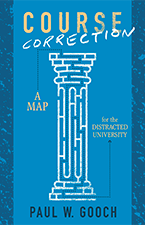
Paul W. Gooch
University of Toronto Press, 2019; 256 pp;
ISBN: 978-1-48752-356-5.
By Howard A. Doughty
Paul W. Gooch is president emeritus and professor of philosophy at Victoria University in the University of Toronto. This biographical detail is important. It quickly establishes a presumption of experience and expertise. His solid academic and administrative credentials at a leading Canadian leading university also intimate a “conservative” perspective in the best possible sense of the word.
Gooch is plainly an academic leader who wants to “conserve” what is valuable amidst the “cacophony of voices” that distracts boards and administrators and make it “difficult to listen properly to what’s important.” He plainly cares about the university as a protected place for free creation and critical assessment of knowledge — not just job training. He emphasizes ideals such as honesty and dependability. He advocates institutional autonomy, not only from religion, the state, and popular opinion, but also from partisan factions within its walls. He is deeply concerned with students — not in sense of marketing the “student experience,” but in the authentic sense of wanting universities to meet their obligations to teach well and students to reciprocate by learning well.
In the current era of loose talk about innovation, technology, entrepreneurship, employability skills, and (paradoxically) increased demands for rules guaranteeing “free speech on campus” from right-wing ideologues who simultaneously complain about “crazy Marxists,” well-informed, good faith deliberations are rare.
Throughout, the book I could sniff the sentiments of Canada’s beloved conservative philosopher, George Grant, who told all who chose to listen, that “the curriculum is the soul of the university.” I cannot tell if Grant and Gooch would agree on what comprised that “soul,” but I imagine that Gooch would agree that such a soul might at least figuratively exist, and that it should not be reducible to performance indicators, pseudo-technical metrics, and impertinent algorithms which are ultimately unimportant.
Course Correction is divided into two parts of five and three chapters each, plus an epilogue. Gooch immediately establishes the theme and sets the tone: “It’s All about Knowledge, Period.” And, of course, it is — but maybe with some semi-colons and dashes. It is written in what is fashionably called an “accessible style.” It can be read by the intelligent laity, but it is not condescending. It recognizes the need for adaptation and, perhaps, (post)modernization; but, it is not besotted by notions of transformation and Schumpeterian delusions of “creative destruction.” Gooch is acutely aware of the longer view. He is both a man of ideas and a practical man. He traffics in enduring virtues. He takes “respect” seriously, as a dutiful attitude toward others and an invaluable treasure when earned.
Concepts of obligation and respect seldom comport well either with those social institutions that prefer the instrumental rationality or with those critical theorists who would denounce them as oppressive, dehumanizing, and, now, ecocidal. They are drowned out by both whiggish banalities and apocalyptic repudiations of the European Enlightenment and the redemption of the sins of late capitalism.
Calls for a “golden mean” are not easily heard at a time when the fractious noises of political leaders inspire both thoughtless enthusiasm and unrelenting disdain. Yet, Gooch largely succeeds in leading us through the complications of administrative decision-making and managerial practices that, today, must cope with teaching in the face of open access, demographic shifts, economic pressures, and socio-political expectations, and must also confront the toxic changes that some lament as inevitable and others cheer as liberating with all the honesty that he demands of faculty and students.
Though too prudent to praise faculty unions or to address the inherently adversarial nature of employer-employee relations in contemporary education, Gooch acknowledges that the precarity of contract faculty precludes the full exercise of academic freedom, a “messy” concept that is nonetheless essential to any university worthy of the name. He is also outspoken on the fetishism of technologically mediated education in what my friend David Noble called “digital diploma mills.”
The apparently “permanent crisis” in postsecondary education has desensitized many to the moderating sounds coming from people like Gooch, who resist the temptation to melodramatise situations and events and to dismiss or demonize those whose interests compete or conflict with their own — failing to appreciate that we are (or ought to be) engaged in the common project of education and must find common ground.
__________________________________
Howard A. Doughty is a professor in the faculty of arts at Seneca College.